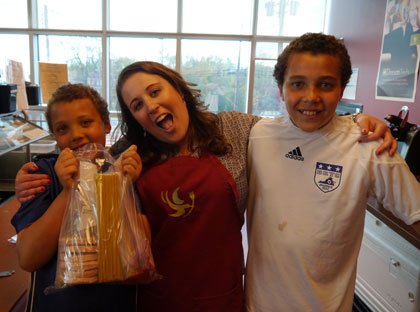Laura Rigney first became aware of the nonprofit dreamMakerS when a friend added her name to the organization’s email list. Rigney says she feels fortunate that she joined.
“I have been attending dreamMakerS events for the past three years and it has made a huge impact on the lives of me and my children,” said Rigney, a divorced mother of three children, Aidan, 9; Tristan, 11; and Kaitlin, 14.
Like more than 2.5 million individuals around the world, including 400,000 Americans, Rigney suffers with multiple sclerosis, the unpredictable and often disabling disease of the central nervous system that disrupts the flow of information within the brain, between the brain and the body.
A family nurse practitioner, Rigney joined dreamMakerS, an organization created by Liza Levenson Sulinksi, a fourth grade teacher from Bethesda. The organization is dedicated to providing programming to meet the needs of children of parents with multiple sclerosis (MS).
The goal of dreamMakerS is to create a community for children and families living with MS. Sulinksi said MS has always been a part of her family’s life even before they knew there was a name for it. She said her dad stayed behind on family vacations because the sand was too unsteady for him to walk on and he suffered from double vision and had difficulty remembering the names of friends.
“When my dad took me to visit colleges, I was the only high school student without a parent joining me on the tours,” Sulinksi noted on her website.
It’s that experience and others that underscore the reason for dreamMakerS and the various programs the organization hosts, including the upcoming day for families scheduled for 10 a.m. Saturday, March 14, 2015 at Johns Hopkins Hospital.
The event is a partnership with the Johns Hopkins MS Center and is part of “Brain Awareness Week” through the Dana Foundation in New York.
Activities will include simulations of MS symptoms, art projects like “build a brain,” opportunities for kids to learn about how MS affects brains and then bodies, and time for them to learn about doctors’ appointments their parents attend.
“The upcoming family day is important because we all need to become more educated in MS and how to deal with it as a family,” Rigney said.
“The day we attended our first dreamMakerS event, our lives changed for the better. They did not have to explain to the other children because the other children understood,” she said. “We get to see familiar faces going through similar daily struggles. While the children do their activities, the parents get to talk and share both experiences in life as well as with MS with each other.”
Founded four years ago, dreamMakerS has operated primarily in the Greater Washington, D.C. area, only recently expanding to Howard County and Baltimore.
All of the programs offered are free to families living with MS and officials said they hope to reach as many as possible.
For African-Americans, Sulinksi says two recent studies indicate MS is more common than in other groups. There is also new research that shows that African Americans may have more relapses and more physical disability.
“Being a child of someone with MS is extremely stressful. MS symptoms can vary day by day and hour by hour,” Rigney said. “My children have had
to be forced to grow up fast. They are often playing the role of caretaker to me when I am having rough days. They feel guilty if I have symptoms attending an event of theirs. It is hard for them to explain this to their peers. They are a lot of misconceptions about MS and its prognosis.”
Also, Rigney said that many with MS have even had a difficult time getting a proper diagnosis because individuals may have experienced unique symptoms or the disease may not have appeared on an MRI early enough.
She said it’s important to meet others with MS so sufferers won’t feel alone.
“Education is the key to spreading the word about MS. I am in a multicultural family. I am white and my children are half white and half black,” Rigney said. “It has an impact because I do agree that there is little awareness in general of MS, but even more in vulnerable communities. It is important that all populations are aware of MS so that they can recognize it when it occurs. Early treatment makes a huge difference.”
For more information about dreamMakerS, visit www.msdreammakers.org.
